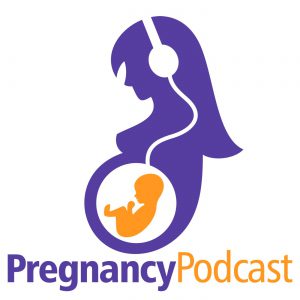
The Pregnancy Podcast: When Birth Does Not Go As Planned

Why this podcast?
Because I love this podcast.
I was scrolling through the more recent Pregnancy Podcast episodes to choose something to listen to in the kitchen and I found this episode. I knew I wanted to feature it here but I wasn’t sure if I could feature the Pregnancy Podcast for the fourth time!
Then I realised, of course I could!
This podcast was the first birth podcast I ever listened to.
It has added to the knowledge gained from my doula studies and it was my inspiration for starting this blog.
I love that the episodes are, as Vanessa would put it, short and sweet, that each is laid out in a very structured, easy to listen to way and that everything is evidence-based.
I recommend this podcast as a great way of getting all the info you need surrounding pregnancy, birth and the early postpartum. And, because you know that information is based on sound research, you can be sure that you are making informed choices for you and your baby.
As the Pregnancy Podcast is featuring here for a record breaking fourth time, I thought I would include a picture of the host, Vanessa Merten.

How does it look?
The Pregnancy Podcast is split into three different styles of episode:
1. 40 weeks
2. Q&A and
3. The Pregnancy Podcast
– 40 weeks takes you through what is happening with you and your baby in each week of your pregnancy. Not only that but each week there is a tip for your partner.
Each episode is only five minutes.
– Q&A explores questions from listeners.
Most Q&A episodes are ten minutes or less and areas that have been covered include pregnancy and breastfeeding with large breasts, ultrasound accuracy, postpartum hair loss, sushi, hair dye during pregnancy, choosing the right crib and Bicornuate (heart shape) uterus.
– The Pregnancy Podcast covers a huge range of pregnancy and birth related themes in episodes of thirty minutes or less.
With nearly ninety episodes to date, you can find information on topics such as skin issues during pregnancy, doulas, vaginal tearing, episiotomy & healing, communicating with your care provider, vaccines, pregnancy dental care, breech babies and bottle feeding.

Why this episode?
I felt that this episode was a good one to feature as a kind of sister post to At Least You Have a Healthy Baby, which focused on postpartum mood disorders.
The way you look back on your birth experience can have an impact on the likelihood that you develop a postpartum mood disorder.
Interestingly, it is not necessarily the case that if your birth does not go as planned that you look back on the experience negatively. It seems that it is more important that the birthing woman feels she was involved in all of the decisions along the way than how the birth itself played out.
Having said that, if your birth experience is totally different than you expected it to be that can be a big thing to move past.
This episode provides some tips that you can apply if your birth does not go as planned.
Who should listen to this episode?
All pregnant women and probably their birth partners too.
Nobody thinks that their birth will take an unexpected turn but being prepared for that event could help you to process it afterwards, to allow yourself any feelings of sadness and to acknowledge the positive aspects as well.

The episode
Something that stood out for me immediately was that Vanessa, whilst giving examples of how birth can take an unexpected path, did not just give examples of unmedicated, natural births ending up as cesareans but of women who planned to get an epidural as early as possible being unable to get one.
Yes, we know that undisturbed birth is generally the way to go for birth to work the way it was designed to but that doesn’t mean other kinds of birth are not valid.
Not being able to have an epidural when you knew that was what you wanted can be just as traumatic as having an epidural when you were set on an unmedicated birth.
There is no judgement in this or any other Pregnancy Podcast episode.
All feelings are valid
I love that one of the first things that comes up is that, yes, it’s important that both you and your baby are healthy, but how you feel about your birth experience matters too and any feelings you have about it, ANY FEELINGS AT ALL, are completely valid.
You are not alone
Vanessa cites a study involving over thirty-eight thousand first-time mothers. The study found that the biggest reason for giving birth via cesarean was failure to progress.
35.4% of these first-time mothers had a cesarean due to a failure to progress.
27.3% ended up with a cesarean due to non-reassuring fetal heart rate.
What does this tell us?
Not one of that 62% of women were planning to birth their baby via cesarean.
All of the women in that 62% had labours that did not go to plan.
Whether all of those cesareans were necessary and the much higher than recommended cesarean rate are topics for another post.
You did not fail
Labour and birth are intense and sometimes quick decisions have to be made.
Whatever decisions you made, even if they differed hugely from your vision, are ok.

Making peace with a birth that did not go as planned
Acknowledge whatever feelings you are experiencing, don’t push them away or ignore them.
Anger, grief, disappointment, sadness.
These feelings are ok.
These feelings are valid.
The idea that life with a new baby should be all fluffy pink clouds and pure happiness can make new mums feel guilty if they are feeling anything but joy.
Yes, you love your baby and I’m sure you get a lot of joy from them too, but that doesn’t mean you can’t experience other emotions as well.
Give yourself permission to be sad
It is ok to feel sad or angry or disappointed or whatever it is that you are feeling. Allow yourself some time and space to experience these feelings and work through them.

Focus on the positive
This doesn’t mean ignoring any less-than-positive aspects of your birth or pretending that they didn’t happen but don’t forget that there were positive aspects too.
This could be anything from acknowledging all the choices and sacrifices you made during your pregnancy to ensure that your baby was healthy to the way you and your partner worked together during some intense labour moments or simply a moment when you felt strong or excited or realised you were about to meet your baby.
Postpartum mood disorders
These are very common and you should not assume that you will not be affected.
They are also very treatable.
Having negative feelings about your birth experience can increase your risk of developing one of these disorders.
Episode fourteen of The Pregnancy Podcast and my post, At Least You Have a Healthy Baby, go into postpartum mood disorders in a lot more detail and I highly recommend that you explore these.
If you think you may have a postpartum mood disorder, please talk to your care provider as soon as you can.
Fears from a previous birth
Communication is key.
Raise any concerns about a previous birth with your midwife or doctor and talk to them about how you can have a different experience this time.

Have a Plan B
Even if the last thing you want is a cesarean, learn about them anyway.
The more you know, the more options you will have and the more you can be involved in the decision-making process.
Things like family-centred cesareans, immediate skin-to-skin and single or double layer suturing are some aspects to explore.
Having a Plan B means that, in the event that things do not go to plan, you can still make informed decisions and play a key role in the decision-making process.
Vanessa invites you to contact her for copies of her birth plans so that you can get an idea of what you might like to include.
To wrap up
I think it is so important to get informed and prepare for the birth experience that you want.
If for some reason, birth takes an unexpected turn, it is ok to grieve for the birth experience that you wanted but didn’t have.
Preparing up front for an unexpected outcome could really help to lessen feelings of sadness and disappointment and I hope that these strategies will help in acknowledging, validating and processing any feelings you do have.
I would be very interested to hear from you if you had a birth experience that was totally different to what you had prepared for.
In what way was it different? How did you feel about the experience? Did you have a Plan B? If not, do you think it would have helped to have prepared for a different experience?
Other episodes on this topic
Blog Talk Radio – When Your Natural Birth Plan Does Not Go As Planned
Emily Wills is a doula based in Stockholm. She believes that birth can be a beautiful and empowering experience and started this blog as a way of sharing some really great podcasts. She is also a mother of three and an enthusiastic runner.
